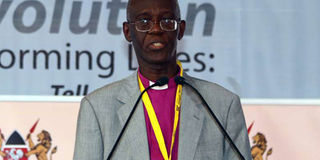We lost the integrity plot way back in 2013

Ethics and Anti-Corruption Commission chairperson Eliud Wabukala speaks during the 4th Devolution Conference in Naivasha on March 9, 2017. The agency should be at the forefront leading the war on graft. PHOTO | SULEIMAN MBATIAH | NATION MEDIA GROUP
What you need to know:
- To become a top official in this government, one needs clearance from five or more institutions.
- After the promulgation of the new constitution in 2010, a state of euphoria gripped the republic.
This past week, a couple of events have highlighted the dilemma Kenyans find themselves in as they seek to change the character of the nation’s leadership.
First, the National Assembly adopted the report by its Public Accounts Committee indicting several politicians, most of them looking to be on the August 8 ballot, for corruption related to the loss of billions of shillings at the National Youth Service.
The National Assembly recommended that these individuals be investigated and even barred from holding public office.
LIST OF SHAME
Secondly, a civil society caucus issued a statement blacklisting a score of politicians with what they deemed to be serious integrity issues at odds with Chapter Six of the Constitution that lays the framework for integrity in public office.
They demanded that these politicians be barred from participating in the next General Election and that they face the full force of the law.
The “list of shame” contained names of prominent politicians from both the ruling and opposition coalitions.
REFORMS
To the uninitiated, these moves sound like significant progress in implementing the constitutional provisions relating to leadership and integrity.
One would have high hopes that crooked characters will be weeded out of the electoral contest and only people with high moral integrity would vie for public office.
While the optimism among the few is understandable, it is important that we do not forget the lessons of history.
After the promulgation of the new constitution in 2010, a state of euphoria gripped the republic.
ICC ISSUE
We expected to enter a new era where, by operation of the law, the choices of leaders we get would reflect our lofty values as clearly enunciated in the constitution.
We were confident that these provisions would come into force and apply to the General Election in 2013.
It is both our fortune and misfortune that the first big test for Chapter Six of our constitution applied to two contestants for the highest offices in the land, the President and Deputy President.
This was a fortunate thing because it was expected to set the bar for everyone with integrity challenges attempting to enter public service.
JUDICIAL SYSTEM
As it turns out, our judiciary helped midwife the interpretation that, as long as you have not been prosecuted up to the Supreme Court and lost, you can run for office no matter the magnitude of the accusations against you.
The fact that the first presidential candidate and his running mate successfully campaigned under very difficult circumstances with the Damoclean Sword of the International Criminal Court (ICC) hanging over their heads ended all pretence at enforcing integrity outside of our judicial system.
While the constitution provides a moral test for integrity, our courts and body politic have reduced it to a judicial process that begins with accusations of impropriety and ends with a conviction after all processes have been exhausted.
CLEARANCE CERTIFICATES
This is becoming an accepted standard in this country, and indeed most public institutions now require all top executives to pass this so-called standard.
To become a top official in this government, one needs clearance from five or more institutions.
The candidate is meant to get a police “Certificate of Good Conduct”, a tax clearance certificate from the Kenya Revenue Authority, clearance from the Ethics and Anti-Corruption Commission and a credit reference bureau, and finally, a clearance certificate from the Higher Education Loans Board.
All these processes have become farcical over the years.
PUBLIC OFFICE
There are convicted criminals vying for positions from inside jail, and known tax evaders with cases pending in court are being cleared for public office.
The less that is said about clearance by the EACC the better, given that this Commission has distinguished itself more by its bark than its bite.
It is completely ridiculous for anyone to expect that an edict by the National Assembly or a civil society organisation will stop anyone in this country from running for and winning public office.
We lost the plot in 2013!
Atwoli is Associate Professor and Dean, Moi University School of Medicine [email protected]





